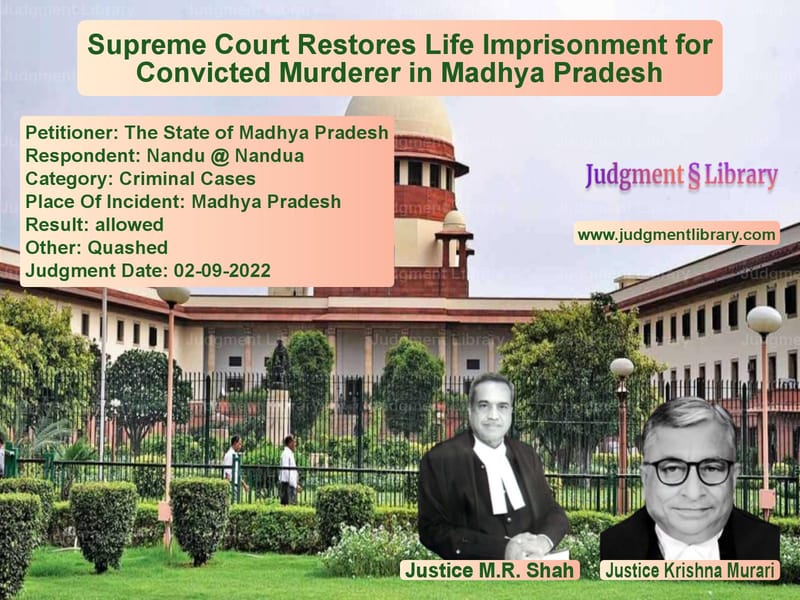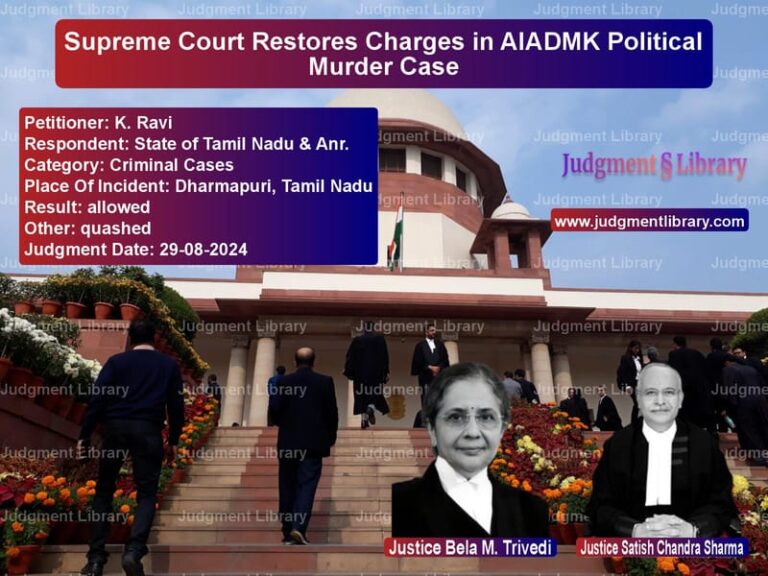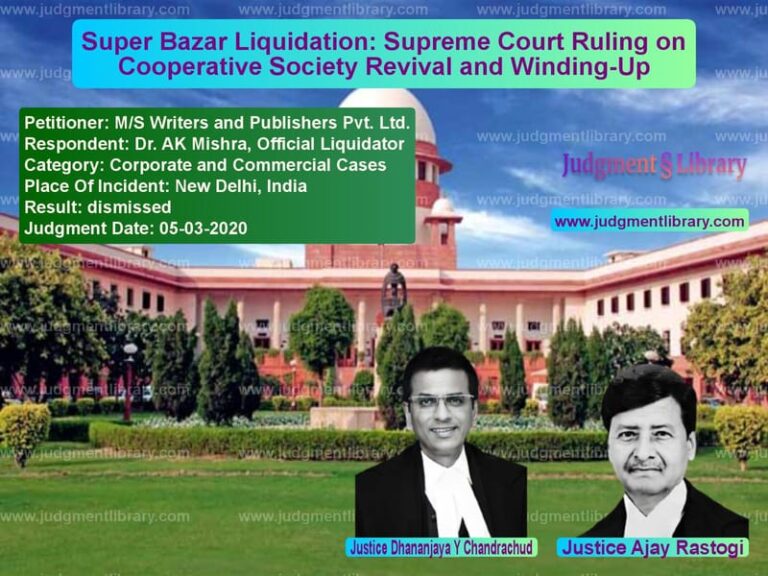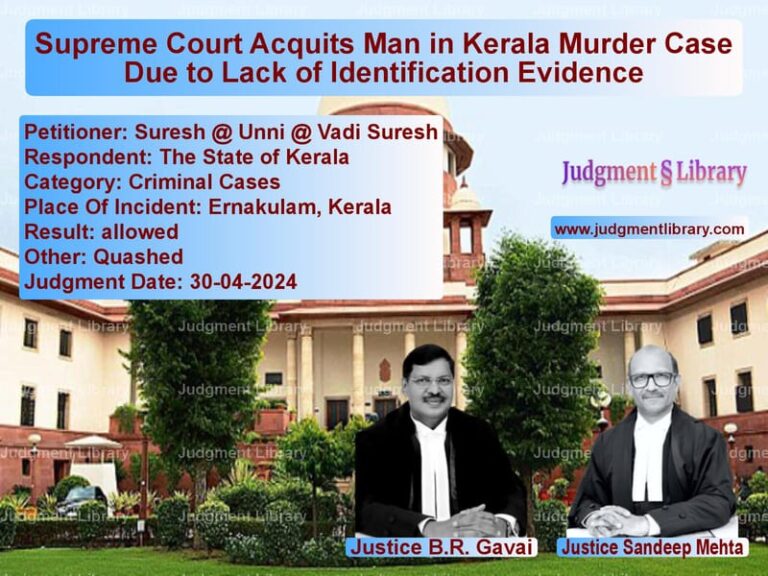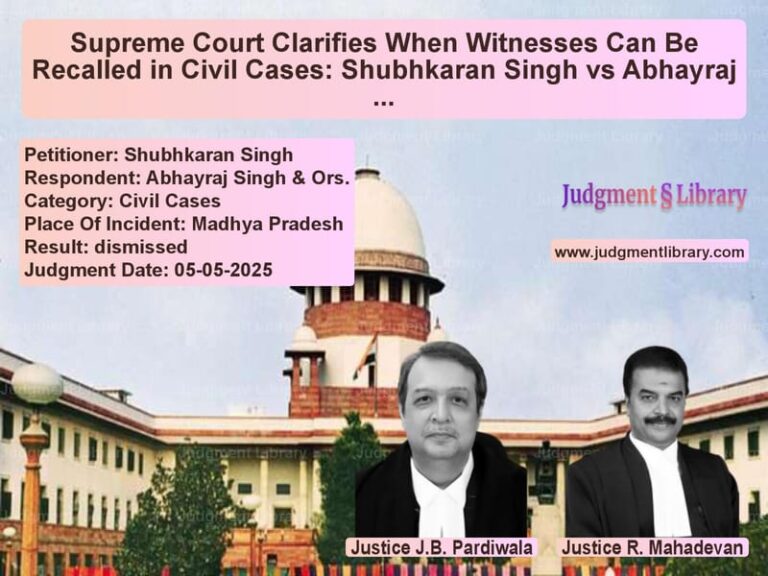Supreme Court Restores Life Imprisonment for Convicted Murderer in Madhya Pradesh
The Supreme Court of India has delivered a significant ruling in the case of The State of Madhya Pradesh vs. Nandu @ Nandua, overturning a judgment of the High Court that had reduced the sentence of the accused from life imprisonment to the period already undergone. The case revolved around the conviction of the respondent under Sections 147, 148, 323, and 302/34 of the Indian Penal Code (IPC), which had originally resulted in a life imprisonment sentence. However, the High Court of Madhya Pradesh had reduced this to seven years and ten months—the period the accused had already served. The Supreme Court found this decision impermissible and restored the original life imprisonment sentence.
Background of the Case
The case was initially tried in the trial court, where the respondent, along with other accused individuals, was convicted under multiple sections of the IPC, including Section 302, which pertains to murder. The trial court sentenced him to life imprisonment. However, upon appeal, the High Court upheld the conviction but modified the sentence, reducing it to the time already served. This prompted the State of Madhya Pradesh to file the present appeal before the Supreme Court.
Arguments Presented
Arguments by the State
Ms. Ankita Chaudhary, learned Deputy Advocate General appearing for the appellant, argued that under Section 302 IPC, the minimum punishment prescribed is life imprisonment, with the only alternative being the death penalty. She contended that any sentence lower than life imprisonment would be legally unsustainable. She further argued:
Read also: https://judgmentlibrary.com/supreme-court-dismisses-review-petition-in-madhya-pradesh-murder-case/
- That once an accused is convicted for murder under Section 302 IPC, the court has no discretion to impose a sentence less than life imprisonment.
- That the High Court’s decision to reduce the sentence to seven years and ten months violated the fundamental principles of sentencing under the IPC.
- That the High Court’s action effectively contradicted the legislative intent behind Section 302, which prescribes a minimum punishment of life imprisonment.
Arguments by the Respondent
The respondent argued that the High Court had acted within its discretionary powers in modifying the sentence, considering mitigating factors such as the circumstances of the crime and the period already served. The respondent’s counsel contended that:
- The High Court was justified in exercising its discretion in reducing the sentence.
- The principle of proportionality should be applied, given that the accused had already served a significant portion of his sentence.
- That the High Court had taken into account the right to private defense in its consideration.
Supreme Court’s Observations
The Supreme Court, after reviewing the arguments, made the following observations:
- The punishment for murder under Section 302 IPC is either death or life imprisonment, with no scope for a lesser sentence.
- The High Court, while maintaining the conviction of the accused for the offense under Section 302 IPC, had reduced the sentence to a period of less than life imprisonment, which is contrary to the law.
- Allowing such a reduced sentence would set a dangerous precedent and dilute the strict statutory mandate under Section 302 IPC.
The Court categorically held: “There cannot be any sentence/punishment less than imprisonment for life, if an accused is convicted for the offense punishable under Section 302 IPC. Any punishment less than imprisonment for life for the offense punishable under Section 302 would be contrary to Section 302 IPC.”
Final Verdict
The Supreme Court allowed the appeal filed by the State of Madhya Pradesh, quashed the High Court’s order, and restored the trial court’s original sentence of life imprisonment. The Court also directed the accused to surrender before the concerned authorities within eight weeks to serve the remainder of his sentence.
Read also: https://judgmentlibrary.com/supreme-court-declares-petitions-infructuous-in-gujarat-riot-cases/
Conclusion
This ruling underscores the Supreme Court’s commitment to upholding the statutory mandates of the Indian Penal Code. The judgment serves as a reaffirmation that courts must adhere strictly to the prescribed punishments for serious offenses such as murder. The case reaffirms that judicial discretion cannot override legislative intent, particularly in cases involving offenses carrying mandatory minimum sentences.
Petitioner Name: The State of Madhya Pradesh.Respondent Name: Nandu @ Nandua.Judgment By: Justice M.R. Shah, Justice Krishna Murari.Place Of Incident: Madhya Pradesh.Judgment Date: 02-09-2022.
Don’t miss out on the full details! Download the complete judgment in PDF format below and gain valuable insights instantly!
Download Judgment: the-state-of-madhya-vs-nandu-@-nandua-supreme-court-of-india-judgment-dated-02-09-2022.pdf
Directly Download Judgment: Directly download this Judgment
See all petitions in Murder Cases
See all petitions in Bail and Anticipatory Bail
See all petitions in Attempt to Murder Cases
See all petitions in Judgment by Mukeshkumar Rasikbhai Shah
See all petitions in Judgment by Krishna Murari
See all petitions in allowed
See all petitions in Quashed
See all petitions in supreme court of India judgments September 2022
See all petitions in 2022 judgments
See all posts in Criminal Cases Category
See all allowed petitions in Criminal Cases Category
See all Dismissed petitions in Criminal Cases Category
See all partially allowed petitions in Criminal Cases Category

